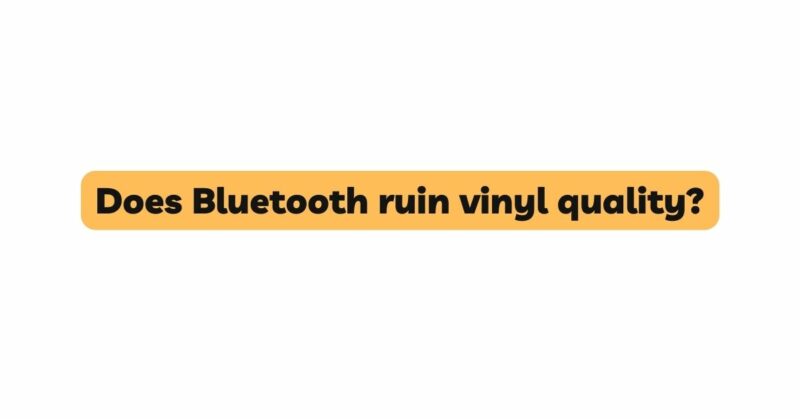The resurgence of vinyl records has ushered in a renaissance of analog audio appreciation, inviting music enthusiasts to embrace the warmth, depth, and authenticity of vinyl sound. Yet, as technology continues to advance, new questions arise about how modern wireless technologies, such as Bluetooth, affect the integrity of vinyl sound quality. A common query that often surfaces is: Does Bluetooth ruin vinyl quality? In this article, we embark on a comprehensive exploration of this topic, unraveling the complexities, examining potential concerns, and shedding light on the true relationship between Bluetooth and the cherished sonic characteristics of vinyl records.
Vinyl Sound Quality: A Unique Analog Experience
Vinyl records are celebrated for their distinct and nostalgic sound characteristics. The process of vinyl playback involves the stylus tracing the grooves of the record, translating these physical movements into electrical signals. This intricate interaction between the stylus and the record’s surface captures not only the musical notes but also the imperfections, warmth, and nuances that contribute to the vinyl’s signature sound. The analog nature of vinyl reproduction is known for delivering a more organic and emotionally engaging listening experience.
Bluetooth Technology and Its Implications
Bluetooth technology, on the other hand, is a wireless communication standard that has revolutionized the way we connect and transmit audio. It allows devices to communicate and exchange data over short distances, making it possible to stream music wirelessly from various sources. However, concerns about Bluetooth’s impact on audio quality have sparked debates within the audiophile community, especially when it comes to preserving the intricacies of vinyl sound.
Addressing the Concerns: Myths vs. Reality
- Compression and Loss of Quality: Myth: Critics often claim that Bluetooth uses heavy compression, leading to a loss of audio quality and detail, which can be especially damaging to the delicate nuances of vinyl sound.
Reality: While it’s true that early iterations of Bluetooth relied on compression algorithms that compromised audio quality, modern Bluetooth versions and codecs have made significant advancements. Codecs like aptX and LDAC are designed to deliver high-quality audio streaming with minimal compression. Although some data compression is involved, the impact on sound quality is less perceptible than in previous versions.
- Loss of Analog Warmth: Myth: Bluetooth’s digital nature clashes with the analog warmth that vinyl records are known for, leading to a sterile and less engaging sound.
Reality: While it’s true that Bluetooth is a digital technology, the potential for loss of analog warmth largely depends on the quality of the Bluetooth transmission and the implementation of the codecs. Modern codecs are designed to maintain audio fidelity during wireless transmission, and with careful design, the impact on sound quality can be mitigated.
- Interference and Signal Integrity: Myth: Bluetooth can introduce interference and degrade signal integrity, resulting in a distorted and compromised listening experience for vinyl enthusiasts.
Reality: Bluetooth technology has evolved to minimize interference and ensure reliable signal transmission. Modern Bluetooth devices often use frequency-hopping spread spectrum technology, which helps reduce interference from other wireless devices and maintains signal integrity.
Preserving Vinyl Sound Quality in a Bluetooth Era
- Choose High-Quality Codecs: When considering Bluetooth-enabled devices, opt for those that support high-quality codecs like aptX and LDAC. These codecs prioritize audio fidelity and minimize the loss of detail during wireless transmission.
- Use Bluetooth Transmitters: If you’re concerned about the impact of Bluetooth on your vinyl playback, consider using a Bluetooth transmitter that connects to your turntable’s output. This can provide a higher-quality wireless link to your speakers or headphones.
- Prioritize Wired Connections: For purists who value the utmost audio fidelity, utilizing wired connections between your turntable and audio equipment remains the most direct way to preserve the nuances of vinyl sound.
- Personal Preference Matters: At the heart of the discussion is your personal listening preference. While Bluetooth technology offers convenience and flexibility, you should prioritize the audio experience that aligns with your taste and priorities.
Conclusion
The question of whether Bluetooth ruins vinyl quality is a complex and nuanced one. While initial concerns about Bluetooth’s impact on sound quality were valid, advancements in Bluetooth technology have ushered in a new era of higher-quality wireless audio transmission. Modern codecs like aptX and LDAC prioritize audio fidelity and mitigate the loss of detail during wireless playback.
Vinyl enthusiasts have the power to strike a balance between modern convenience and audio purity. Whether you choose to embrace the convenience of Bluetooth or prioritize the analog warmth of wired connections, the magic of vinyl sound is a captivating journey that transcends technological debates. In the end, it’s the emotional connection to music that matters most, and the richness of vinyl’s signature sound continues to resonate with listeners in an ever-evolving audio landscape.


